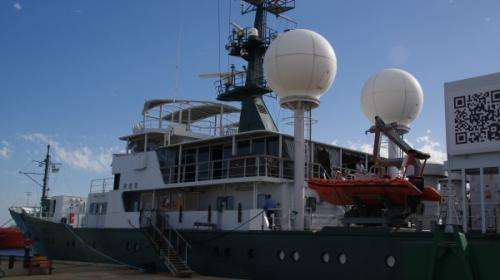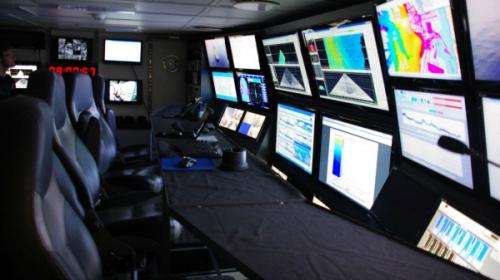The R/V Falkor (pictured) launches today carrying researchers to the Perth Canyon. Credit: Michael Hopkin
A world-first expedition backed by Google billionaire Eric Schmidt is bidding to unlock the secrets of the Perth Canyon, the vast undersea gorge carved by the prehistoric Swan River.
The canyon—Australia's largest undersea valley—has never been properly surveyed, despite the fact that its eastern end is just 10km west of Rottnest Island.
Researchers led by UWA oceanographer Malcolm McCulloch will spend 12 days studying the conditions and marine life inside the canyon, a sloping trough that ranges from 200m deep at its head to 4000m where it meets the ocean floor.
"It's a hotspot for marine life, but has not been officially designated as a marine park," Professor McCullough says.
His team will send down submersible remotely operated vehicles (ROVs) for several hours each day to study the currents and conditions, as well as to search for organisms such as deep-sea corals.
Previous surveys only involved using sonar to map the canyon's depths, or dredging up samples from the valley floor.
"The very steep sides of the canyon are where we'll likely find the best habitats for coral," Prof McCulloch says.
The researchers will be sailing aboard the R/V Falkor—a research vessel owned by the Schmidt Ocean Institute, founded by Google's executive chairman.
The institute offers the vessel for free to scientists who want to study parts of the ocean that might otherwise go unexplored.
Inside the R/V Falkor. Credit: Michael Hopkin
Since 2012, the 83m former fisheries protection vessel has roamed the seas from the Gulf of Mexico to Guam.
One expedition last year plumbed the depths of the Marianas Trench—the deepest point on the globe.
The vessel features acoustic surveying systems, onboard laboratories for storing samples, platforms for launching submersible vehicles, a mini airship for aerial surveys, and even a sauna for relaxing in after a long shift.
Schmidt Institute technician Leighton Rolley says the ship is "capable of delivering instruments to and from the deepest depths", adding that the institute is also aiming to develop a submersible craft that can descend to 11,000m.
The ROVs for the Perth Canyon voyage won't delve as deep as that.
But by studying deep-water corals that can live for centuries, Prof McCullough and his team hope to build up a picture of how carbon dioxide levels deep in the ocean have fluctuated over time.
"These species are highly sensitive to ocean acidification, such as from the carbon dioxide channeled down into deep oceans [via the canyon]," he says.
The public can also keep tabs on the expedition, which launches today.
"We will be aiming to stream all of the video [from the ROVs] online in real time," says fellow UWA oceanographer Charitha Pattiaratchi.
Provided by Science Network WA
























